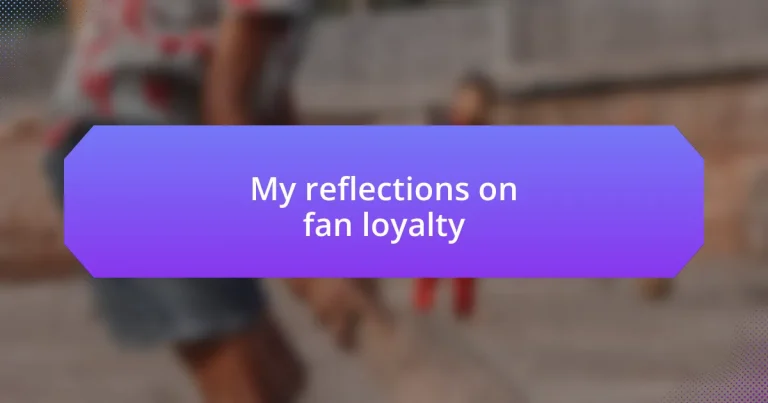Key takeaways:
- Fan loyalty stems from emotional connections, shared experiences, and a sense of belonging to a community.
- Engagement strategies, such as personal interactions and storytelling, foster deeper connections with fans.
- Recognizing fan contributions and offering unique experiences strengthen loyalty to teams or brands.
- Effective measurement of fan loyalty involves analyzing engagement data and gathering direct feedback from fans.
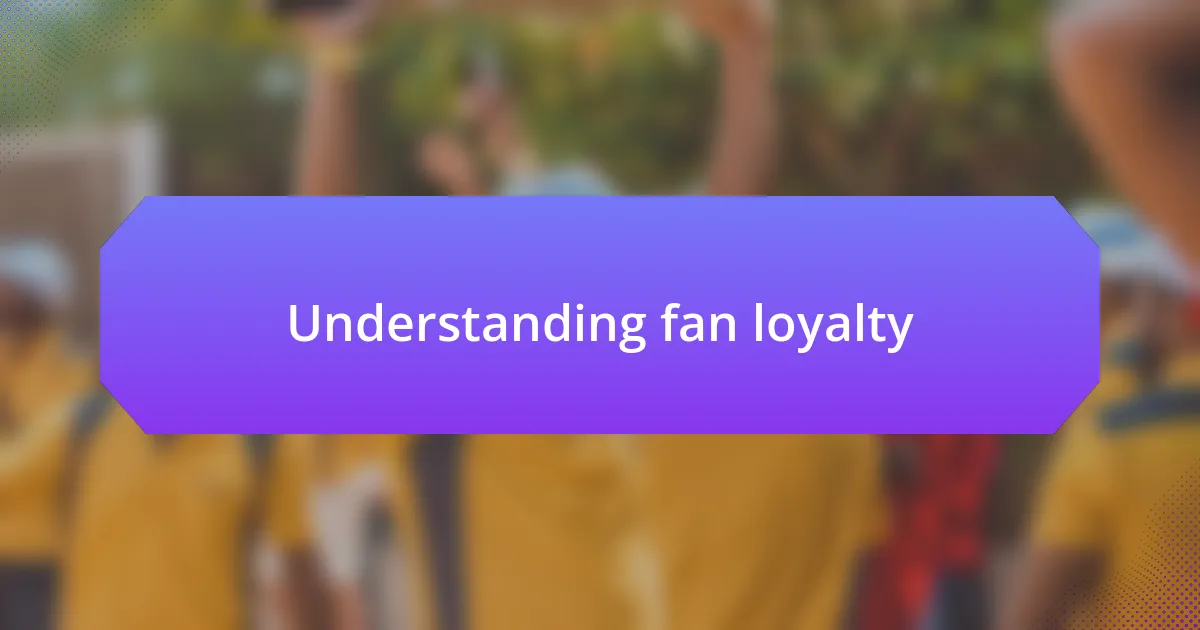
Understanding fan loyalty
Fan loyalty is a fascinating phenomenon that goes beyond just liking a product or a team; it’s about emotional connections. I remember the first time I stood in a stadium, surrounded by passionate fans, all chanting in unison. That moment made it clear to me: loyalty is rooted in shared experiences and collective identity.
Consider how often you’ve seen fans wear their team colors or sport merchandise. This isn’t simply about fashion; it’s a badge of honor that signifies belonging. I think about my own experience attending concerts. Wearing a band’s shirt feels like communicating a deeper bond with those around me—almost like a secret handshake among friends. Why do we crave this connection?
At its core, fan loyalty often develops from personal memories tied to specific moments. For me, reminiscing about the first game I attended creates a rush of nostalgia. It wasn’t just about the game; it was the friends I made and the laughter we shared. It’s incredible how these shared memories can solidify our loyalty, isn’t it?
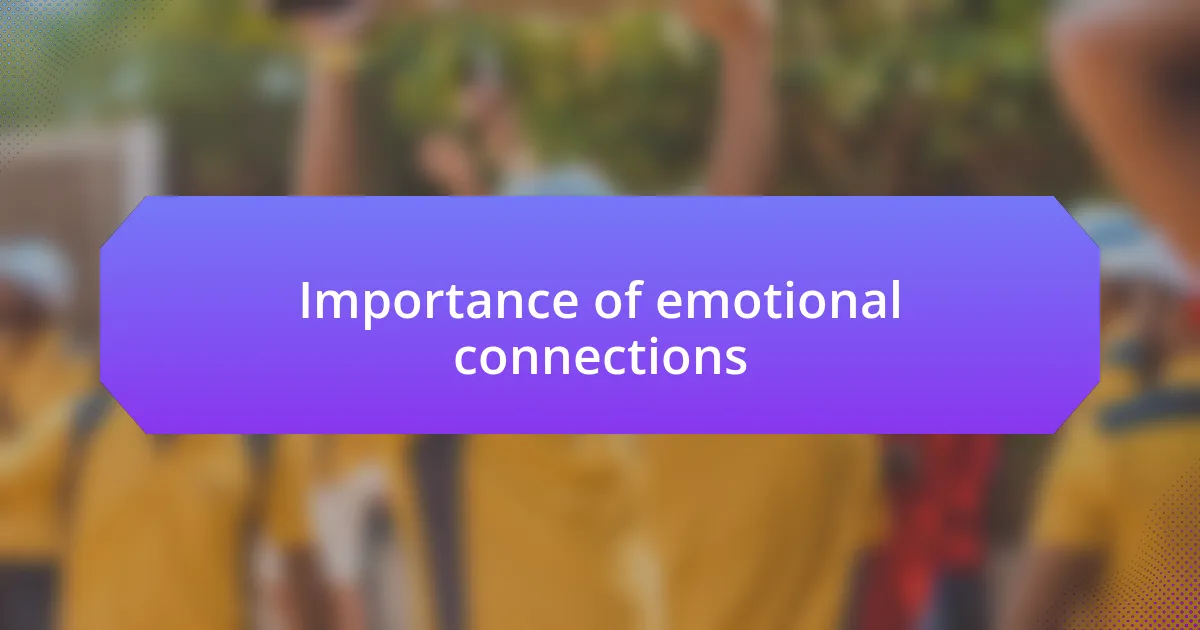
Importance of emotional connections
Emotional connections form the bedrock of fan loyalty. I vividly recall a time when my favorite team made a stunning comeback in the last minutes of a game. The sheer exhilaration I felt—not just alone, but alongside thousands of strangers who were transformed into friends in that moment—exemplified how powerful these connections can be. It’s more than just winning or losing; it’s the thrill of experiencing a rollercoaster of emotions together that cements the bond.
When fans engage deeply with a team or brand, they often imbue it with personal meaning. I remember feeling a part of something greater when I joined an online community dedicated to my favorite band. The discussions and shared experiences fostered a sense of belonging that transcended geography. This emotional engagement creates advocates who are willing to defend and promote their beloved teams or brands passionately.
Ultimately, establishing these emotional connections is crucial for maintaining loyalty. I’ve noticed that brands that invest in building relationships with fans—whether through storytelling, shared values, or interactive experiences—tend to retain a more dedicated following. When a fan relates to a brand’s message at an emotional level, they are more likely to stick around through thick and thin.
| Factors | Examples |
|---|---|
| Shared Experiences | A thrilling game or concert attended together |
| Symbolic Representation | Wearing team colors or merchandise |
| Community Engagement | Online forums or fan meet-ups |
| Emotional Investment | Memories tied to events or milestones |
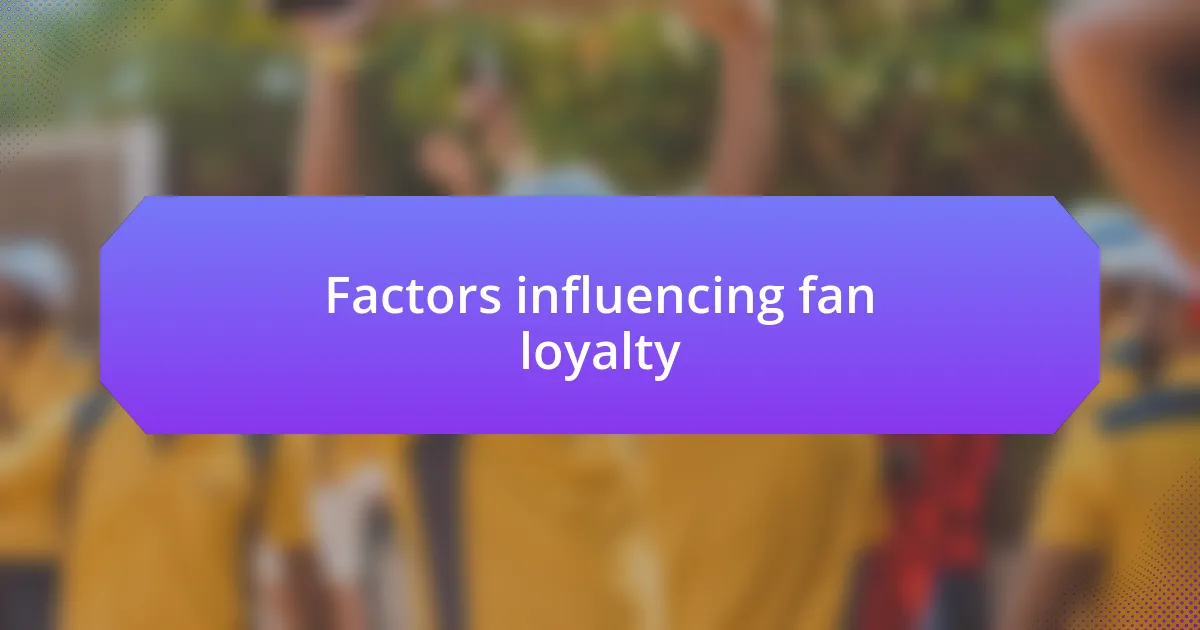
Factors influencing fan loyalty
Fan loyalty is a multifaceted phenomenon, influenced by various factors that go beyond mere preferences for teams or brands. One significant factor is the feeling of belonging that manifests from shared experiences. I remember a memorable playoff game when the atmosphere was electric. Everyone around me, strangers just moments before, became united as we cheered together, amplifying my love for the team. It was a moment where camaraderie turned into a powerful reminder that I was part of something bigger.
Factors that influence fan loyalty include:
- Community Building: The way fans connect through social media or local gatherings creates a strong network of support.
- Personal Narratives: Fans often weave their own stories around the teams or brands they support, turning wins and losses into meaningful life chapters.
- Cultural Significance: Teams that resonate with local or national identity tend to foster deeper loyalty among fans.
- Trust and Consistency: Organizations that consistently deliver on their promises keep fans engaged and committed.
- Recognition and Reward: Acknowledging fan efforts or milestones can enhance the bond, making them feel valued and appreciated.
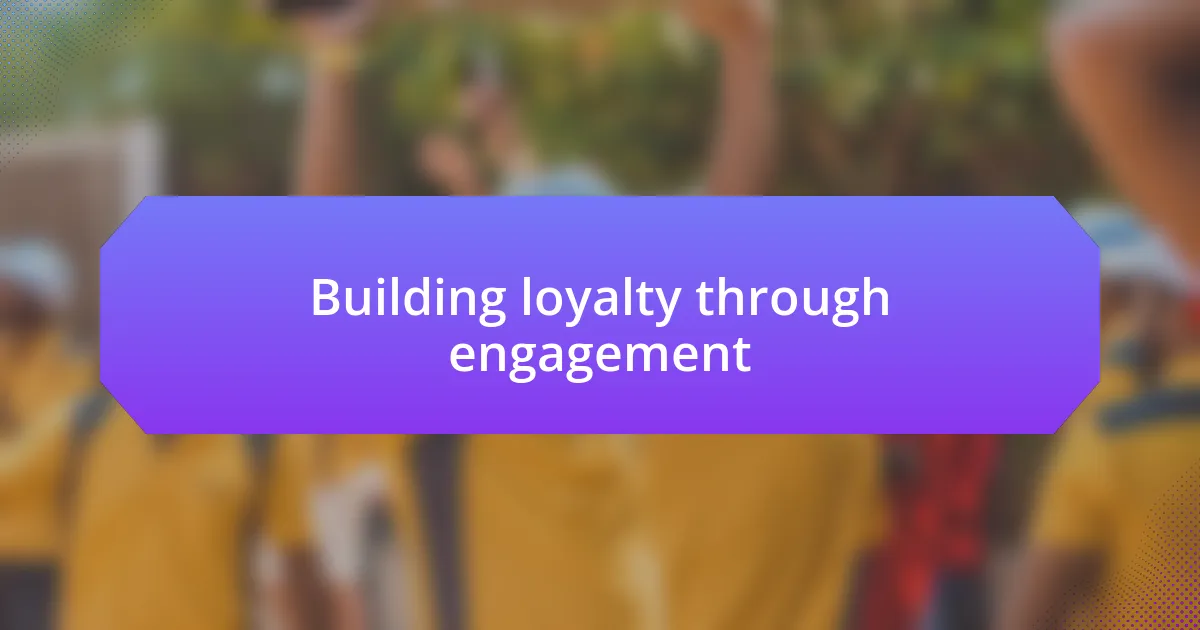
Building loyalty through engagement
Building loyalty through engagement requires a strategic approach that puts fans at the center of the experience. For instance, I recall attending a fan meeting where the team’s staff openly discussed upcoming season changes while encouraging feedback. This transparency wasn’t just refreshing; it made me feel like my voice mattered, strengthening my bond with the franchise. Have you ever been in a situation where you felt truly heard? That feeling is the cornerstone of loyalty.
Engagement can also come from authentic interactions on social media. I remember when a team I follow took the time to respond to fan comments during a tough season. Instead of the usual corporate jargon, they shared their struggles and plans for improvement. That vulnerability really resonated with me. It made me reflect on how important it is to see the human side of organizations; it creates a deeper emotional connection that makes you want to stick around through ups and downs.
Another effective way to build loyalty is through storytelling that invites fans to participate. I once took part in a campaign where fans were encouraged to share their memories tied to the team’s biggest moments. Reading others’ stories made me feel part of an exclusive club, united by shared passion. How often do we get to relate our personal journeys to something larger? Those moments of connection are what keep fans engaged and loyal.
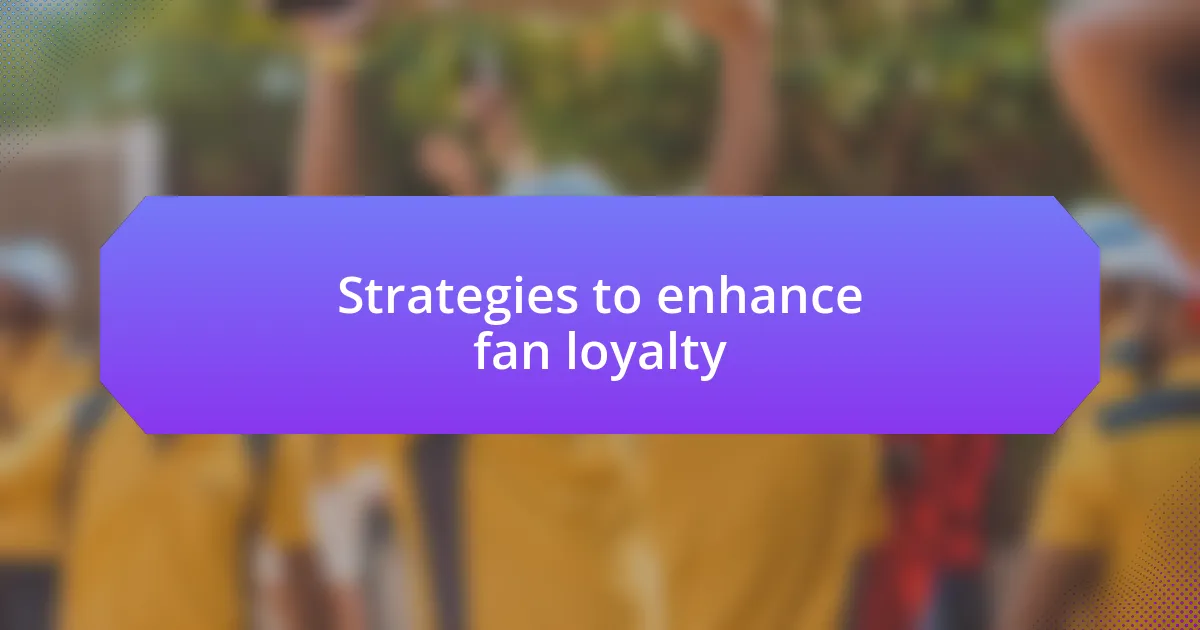
Strategies to enhance fan loyalty
Creating memorable experiences is one of the most effective strategies for enhancing fan loyalty. I once attended a fan-exclusive event featuring behind-the-scenes tours of the stadium and meet-and-great sessions with players. That day, I felt like I was part of something special, not merely a spectator. Isn’t it fascinating how shared experiences can forge lasting bonds? When fans are offered unique opportunities, they often feel a stronger allegiance to the team.
Loyalty programs can also play a critical role in building connections. I remember a time when my favorite team introduced a rewards program where fans could earn points for attending games and purchasing merchandise. The thrill of accumulating points transformed what could have been a simple transaction into an exciting journey. Have you ever been on a quest for something you really wanted? It’s that sense of purpose that can deepen loyalty to a brand.
Another strategy lies in recognizing and celebrating fan contributions. I once saw a local team host a “Fan of the Month” segment where they highlighted dedicated supporters in their newsletters. This recognition not only made those fans feel valued but also motivated many others to engage more actively. How powerful is it to be recognized within a community? Such initiatives can create a ripple effect, encouraging fans to deepen their interaction with the team.
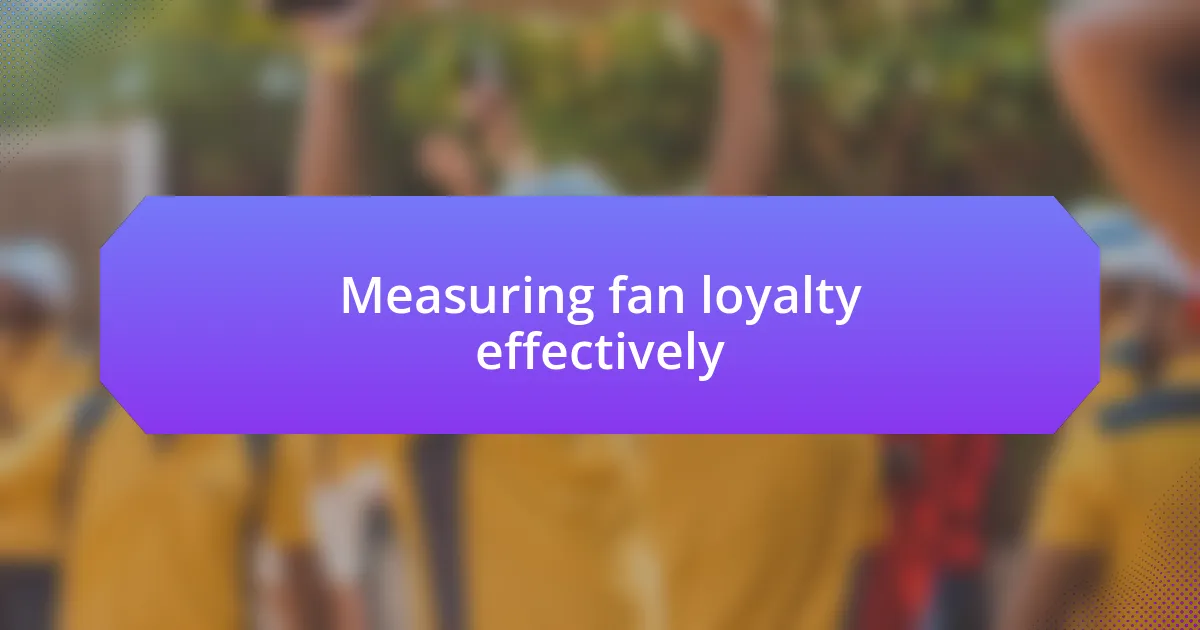
Measuring fan loyalty effectively
Measuring fan loyalty effectively often involves analyzing data from various sources, such as social media engagement and ticket sales. I recall my excitement when I learned about a sports team’s innovative use of analytics to track fan interactions online. They meticulously assessed likes, shares, and comments, revealing which player highlights resonated most with their audience. Isn’t it eye-opening how these metrics can provide a glimpse into what truly captures fans’ hearts?
Surveys and feedback forms can be another powerful tool. I participated in one where I was asked about my favorite game-day rituals and what keeps me coming back. The insights gathered not only helped the team tailor their offerings but also made me feel like my opinion mattered. Have you ever felt that your voice shaped a decision? It’s that sense of influence that can further reinforce loyalty among dedicated supporters.
Another effective way to gauge loyalty is through community involvement. I once attended a charity event organized by my favorite team, where fans and players collaborated for a good cause. The enthusiasm throughout the event was palpable, and it solidified my connection to both the team and the community. How often do we realize that loyalty can flourish in shared values? Measuring this engagement can provide invaluable insights into how fans perceive their relationship with the team.












